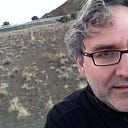Member-only story
Creation versus Natural Selection
Is there a real difference?
We are all of course very familiar with the debates and arguments between traditional Theists who believe that a deity created our universe and the naturalists who claim that our universe, it’s apparent order and structure are a product of natural laws and processes. But if one takes apart the very meaning of the word ‘create’ the difference between these two positions melt away. In the process we open the door to questions about the nature of our own being and if that experience is linked to the primal symmetry breaking which brought our universe into existence.
When we say that something is ‘created’ in the colloquial sense we are implying the existence of a mind and free-will giving rise to a form. From this vantage point the question really becomes if there is a mind and free-will behind the observed order of the universe? But to answer this question first requires understanding what do we mean when we say ‘mind or free will’ and the answer to this question is very far from settled. Yet through the ages some clarity has arisen over the nature and relationship of ‘mind’ to ‘free will’. It is now understood that there are many aspects of mind that are algorithmic and thus deterministic. So for example, memory, sorting, pattern recognition, prediction, mathematics; many functions which in the past were assumed to belong exclusively…
